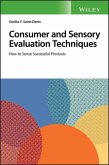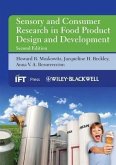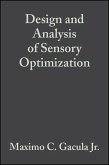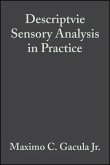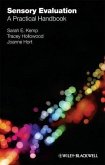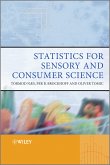Howard R. Moskowitz, Alejandra M. Muñoz, Maximo C. Gacula
Viewpoints and Controversies in Sensory Science and Consumer Product Testing (eBook, PDF)
203,99 €
203,99 €
inkl. MwSt.
Sofort per Download lieferbar

0 °P sammeln
203,99 €
Als Download kaufen

203,99 €
inkl. MwSt.
Sofort per Download lieferbar

0 °P sammeln
Jetzt verschenken
Alle Infos zum eBook verschenken
203,99 €
inkl. MwSt.
Sofort per Download lieferbar
Alle Infos zum eBook verschenken

0 °P sammeln
Howard R. Moskowitz, Alejandra M. Muñoz, Maximo C. Gacula
Viewpoints and Controversies in Sensory Science and Consumer Product Testing (eBook, PDF)
- Format: PDF
- Merkliste
- Auf die Merkliste
- Bewerten Bewerten
- Teilen
- Produkt teilen
- Produkterinnerung
- Produkterinnerung

Bitte loggen Sie sich zunächst in Ihr Kundenkonto ein oder registrieren Sie sich bei
bücher.de, um das eBook-Abo tolino select nutzen zu können.
Hier können Sie sich einloggen
Hier können Sie sich einloggen
Sie sind bereits eingeloggt. Klicken Sie auf 2. tolino select Abo, um fortzufahren.

Bitte loggen Sie sich zunächst in Ihr Kundenkonto ein oder registrieren Sie sich bei bücher.de, um das eBook-Abo tolino select nutzen zu können.
The authors skillfully present different approaches to the same problem and even different ways to look at the same type of data. If you have ever been stumped by a controversy in product assessment, the design of studies, or the analysis of data, you will find the answer in this book.
- Geräte: PC
- mit Kopierschutz
- eBook Hilfe
- Größe: 24.06MB
Andere Kunden interessierten sich auch für
![Consumer and Sensory Evaluation Techniques (eBook, PDF) Consumer and Sensory Evaluation Techniques (eBook, PDF)]() Cecilia Y. Saint-DenisConsumer and Sensory Evaluation Techniques (eBook, PDF)93,99 €
Cecilia Y. Saint-DenisConsumer and Sensory Evaluation Techniques (eBook, PDF)93,99 €![Multivariate Data Analysis in Sensory and Consumer Science (eBook, PDF) Multivariate Data Analysis in Sensory and Consumer Science (eBook, PDF)]() Multivariate Data Analysis in Sensory and Consumer Science (eBook, PDF)133,99 €
Multivariate Data Analysis in Sensory and Consumer Science (eBook, PDF)133,99 €![Sensory and Consumer Research in Food Product Design and Development (eBook, PDF) Sensory and Consumer Research in Food Product Design and Development (eBook, PDF)]() Howard R. MoskowitzSensory and Consumer Research in Food Product Design and Development (eBook, PDF)210,99 €
Howard R. MoskowitzSensory and Consumer Research in Food Product Design and Development (eBook, PDF)210,99 €![Design and Analysis of Sensory Optimization (eBook, PDF) Design and Analysis of Sensory Optimization (eBook, PDF)]() Maximo C. GaculaDesign and Analysis of Sensory Optimization (eBook, PDF)120,99 €
Maximo C. GaculaDesign and Analysis of Sensory Optimization (eBook, PDF)120,99 €![Descriptvie Sensory Analysis in Practice (eBook, PDF) Descriptvie Sensory Analysis in Practice (eBook, PDF)]() Maximo C. GaculaDescriptvie Sensory Analysis in Practice (eBook, PDF)158,99 €
Maximo C. GaculaDescriptvie Sensory Analysis in Practice (eBook, PDF)158,99 €![Sensory Evaluation (eBook, PDF) Sensory Evaluation (eBook, PDF)]() Sarah KempSensory Evaluation (eBook, PDF)82,99 €
Sarah KempSensory Evaluation (eBook, PDF)82,99 €![Statistics for Sensory and Consumer Science (eBook, PDF) Statistics for Sensory and Consumer Science (eBook, PDF)]() Tormod NæsStatistics for Sensory and Consumer Science (eBook, PDF)112,99 €
Tormod NæsStatistics for Sensory and Consumer Science (eBook, PDF)112,99 €-
-
-
The authors skillfully present different approaches to the same problem and even different ways to look at the same type of data. If you have ever been stumped by a controversy in product assessment, the design of studies, or the analysis of data, you will find the answer in this book.
Dieser Download kann aus rechtlichen Gründen nur mit Rechnungsadresse in A, B, BG, CY, CZ, D, DK, EW, E, FIN, F, GR, HR, H, IRL, I, LT, L, LR, M, NL, PL, P, R, S, SLO, SK ausgeliefert werden.
Produktdetails
- Produktdetails
- Verlag: John Wiley & Sons
- Seitenzahl: 492
- Erscheinungstermin: 3. Juli 2008
- Englisch
- ISBN-13: 9780470384909
- Artikelnr.: 38183913
- Verlag: John Wiley & Sons
- Seitenzahl: 492
- Erscheinungstermin: 3. Juli 2008
- Englisch
- ISBN-13: 9780470384909
- Artikelnr.: 38183913
- Herstellerkennzeichnung Die Herstellerinformationen sind derzeit nicht verfügbar.
Howard R. Moskowitz, Ph. D.,Moskowitz Jacobs, Inc., White Plaines, New York, Alejandra M. Muñoz, M.S., IRIS: International Resources for Insights and Solutions, LLC, Mountainside, New Jersey, and Maximo C. Gacula, Jr., Ph.D., Department of Psychology, Arizona State University, Tempe, Arizona.
1. The Role of Sensory Science in the Coming Decade.
2. International Sensory Science.
3. Sensory Mythology.
4. Contrasting R&D, Sensory Science, and Marketing Research Approaches.
5. Validity and Reliability in Sensory Science.
6. The Interface Between Psychophysics and Sensory Science: Methods vs.
Real Knowledge.
7. Descriptive Panel/Experts vs. Consumers.
8. Sample Issues in Consumer Testing.
9. Hedonics, Just-About-Right, Purchase and Other Scales in Consumer Tests.
10. Asking Consumers to Rate Product Attributes.
11. Questionnaire Design.
12. Choice of Population in Consumer Studies.
13. Biases Due to Changing in Market Conditions.
14. Sample Size N or Number of Respondents.
15. The Use and Caveats of Qualitative Research in the Decision Making
Process.
16. The Four D's of Sensory Science: Difference, Discrimination,
Dissimilarity, Distance.
17. Replication in Sensory and Consumer testing.
18. Language Development in Descriptive Analysis and the Formation of
Sensory Concepts.
19. Use of References in Descriptive Analysis.
20. Training Time in Descriptive Analysis.
21. Consumer-Descriptive Data Relationships in Sensory Science.
22. Product and Panelist Variability in Sensory Testing.
23. Foundations of Sensory Science by Daniel Ennis.
24. Applications of SAS Programming Language in Sensory Analysis by Maximo
Gacula, Jr.
25. Advances and the Future of Data Collection Systems in Sensory Science
by André Arborgast, Chris Findlay and Paul Lichtman.
Index
2. International Sensory Science.
3. Sensory Mythology.
4. Contrasting R&D, Sensory Science, and Marketing Research Approaches.
5. Validity and Reliability in Sensory Science.
6. The Interface Between Psychophysics and Sensory Science: Methods vs.
Real Knowledge.
7. Descriptive Panel/Experts vs. Consumers.
8. Sample Issues in Consumer Testing.
9. Hedonics, Just-About-Right, Purchase and Other Scales in Consumer Tests.
10. Asking Consumers to Rate Product Attributes.
11. Questionnaire Design.
12. Choice of Population in Consumer Studies.
13. Biases Due to Changing in Market Conditions.
14. Sample Size N or Number of Respondents.
15. The Use and Caveats of Qualitative Research in the Decision Making
Process.
16. The Four D's of Sensory Science: Difference, Discrimination,
Dissimilarity, Distance.
17. Replication in Sensory and Consumer testing.
18. Language Development in Descriptive Analysis and the Formation of
Sensory Concepts.
19. Use of References in Descriptive Analysis.
20. Training Time in Descriptive Analysis.
21. Consumer-Descriptive Data Relationships in Sensory Science.
22. Product and Panelist Variability in Sensory Testing.
23. Foundations of Sensory Science by Daniel Ennis.
24. Applications of SAS Programming Language in Sensory Analysis by Maximo
Gacula, Jr.
25. Advances and the Future of Data Collection Systems in Sensory Science
by André Arborgast, Chris Findlay and Paul Lichtman.
Index
1. The Role of Sensory Science in the Coming Decade.
2. International Sensory Science.
3. Sensory Mythology.
4. Contrasting R&D, Sensory Science, and Marketing Research Approaches.
5. Validity and Reliability in Sensory Science.
6. The Interface Between Psychophysics and Sensory Science: Methods vs.
Real Knowledge.
7. Descriptive Panel/Experts vs. Consumers.
8. Sample Issues in Consumer Testing.
9. Hedonics, Just-About-Right, Purchase and Other Scales in Consumer Tests.
10. Asking Consumers to Rate Product Attributes.
11. Questionnaire Design.
12. Choice of Population in Consumer Studies.
13. Biases Due to Changing in Market Conditions.
14. Sample Size N or Number of Respondents.
15. The Use and Caveats of Qualitative Research in the Decision Making
Process.
16. The Four D's of Sensory Science: Difference, Discrimination,
Dissimilarity, Distance.
17. Replication in Sensory and Consumer testing.
18. Language Development in Descriptive Analysis and the Formation of
Sensory Concepts.
19. Use of References in Descriptive Analysis.
20. Training Time in Descriptive Analysis.
21. Consumer-Descriptive Data Relationships in Sensory Science.
22. Product and Panelist Variability in Sensory Testing.
23. Foundations of Sensory Science by Daniel Ennis.
24. Applications of SAS Programming Language in Sensory Analysis by Maximo
Gacula, Jr.
25. Advances and the Future of Data Collection Systems in Sensory Science
by André Arborgast, Chris Findlay and Paul Lichtman.
Index
2. International Sensory Science.
3. Sensory Mythology.
4. Contrasting R&D, Sensory Science, and Marketing Research Approaches.
5. Validity and Reliability in Sensory Science.
6. The Interface Between Psychophysics and Sensory Science: Methods vs.
Real Knowledge.
7. Descriptive Panel/Experts vs. Consumers.
8. Sample Issues in Consumer Testing.
9. Hedonics, Just-About-Right, Purchase and Other Scales in Consumer Tests.
10. Asking Consumers to Rate Product Attributes.
11. Questionnaire Design.
12. Choice of Population in Consumer Studies.
13. Biases Due to Changing in Market Conditions.
14. Sample Size N or Number of Respondents.
15. The Use and Caveats of Qualitative Research in the Decision Making
Process.
16. The Four D's of Sensory Science: Difference, Discrimination,
Dissimilarity, Distance.
17. Replication in Sensory and Consumer testing.
18. Language Development in Descriptive Analysis and the Formation of
Sensory Concepts.
19. Use of References in Descriptive Analysis.
20. Training Time in Descriptive Analysis.
21. Consumer-Descriptive Data Relationships in Sensory Science.
22. Product and Panelist Variability in Sensory Testing.
23. Foundations of Sensory Science by Daniel Ennis.
24. Applications of SAS Programming Language in Sensory Analysis by Maximo
Gacula, Jr.
25. Advances and the Future of Data Collection Systems in Sensory Science
by André Arborgast, Chris Findlay and Paul Lichtman.
Index

